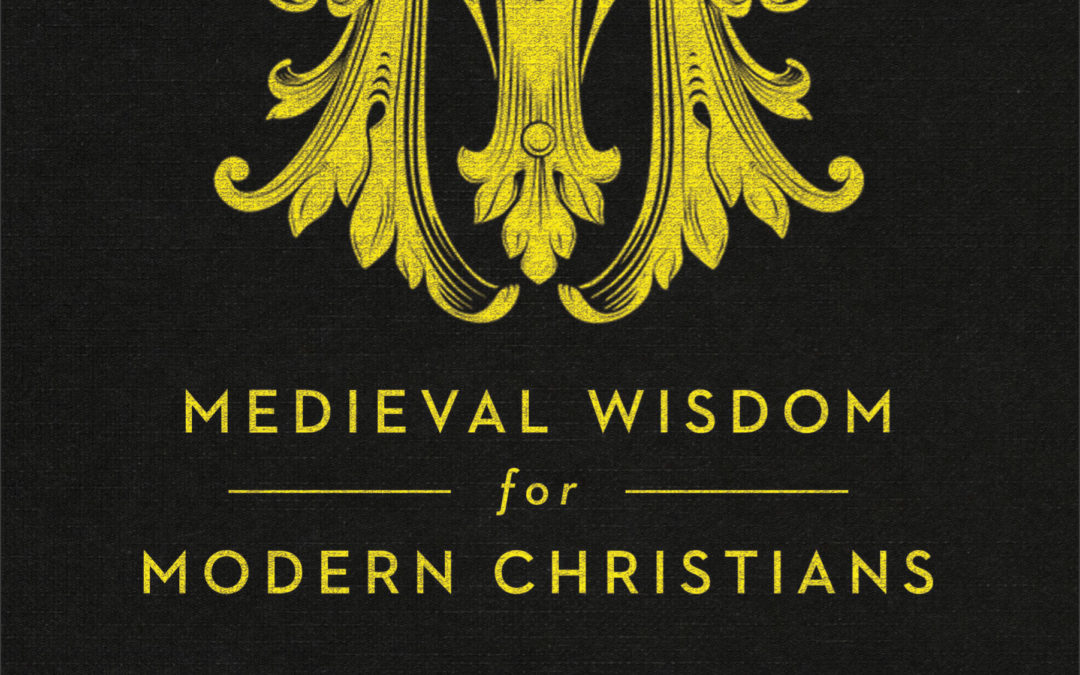Medieval Wisdom for Modern Christians:
Finding Authentic Faith in a Forgotten Age
with C. S. Lewis
by Chris R. Armstrong
A friendly crush of people gathered recently at Anselm House, a study center at the University of Minnesota, to “get medieval” with Chris R. Armstrong, author of Medieval Wisdom for Modern Christians: Finding Faith in a Forgotten Age with C. S. Lewis (2016, Brazos Press). Armstrong, Professor of Biblical and Theological Studies at Wheaton College, spoke about the great value of the Medieval Church’s holistic approach to faith. In his lecture, as in his book, Armstrong highlighted the ability of medieval Christians to keep faith and reason, love and logic, and spiritual and material worlds together, identifying this way of life as “medieval synthesis.” But does the medieval era truly have anything to offer Christians in the post-Christian world? Armstrong’s answer is yes — by adopting some medieval perspectives and practices, modern Christians can experience a profound deepening of their faith.
To help readers “find new roads to past wisdom,” Armstrong has incorporated the writings of C. S. Lewis throughout his book Medieval Wisdom For Modern Christians. What is not widely known about Lewis is that he was a thoroughgoing medievalist who wrote and taught about the middle ages, and strongly believed that there was tremendous everyday value in the way people of medieval times lived their Christian faith. Because Armstrong knows that Lewis possessed these unique qualifications he has wisely drawn upon Lewis’ reputation and his vast body of work to be our trustworthy guide through the medieval world of Anselm, Boethius, Julian of Norwich and others.
In Medieval Wisdom, Armstrong addresses the difficulty that many Protestants have in identifying, much less relating to, medieval wisdom. During the period when he taught at a Minnesota university, Armstrong wondered why so many evangelical Christians “…assume that the church apostatized after it gained cultural influence in the time of Constantine (fourth century) and returned to God only after the sixteenth-century Reformation…. Why this dismissal of church history — more than half of the time between Christ and today?” While teaching a seminary class on the Middle Ages, he became acutely aware that most of his students and friends had been exposed only to caricatures and parodies of the medieval church, and knew nothing of the”… life giving beliefs and practices of our own spiritual heritage.”
In Medieval Wisdom, Armstrong gives what he calls “A Nutshell History” of some current Protestant views that he believes have pre-disposed modern evangelicals to dismiss an “open exploration and application of truths and practices from the medieval period.” As he gives his overview, the author comments that twenty-first century Christians have forgotten the full extent of our Christian history, and laments that we have missed a vital link with the “great cloud of witnesses” — those saints who lived lives of obedience to God in every generation, including the Middle Ages. In contrast, Armstrong notes that Lewis was fully aware of the strength and beauty of the witness of medieval Christians and sought counsel from their lives and collected writings to inform his own faith; Lewis also incorporated medieval influences into many of his books, including the Narniad.
Armstrong contends that two particular beliefs have lost their importance to the Protestant Church – these are the doctrines of creation and incarnation. He writes, “…the modern disenchantment of the material universe has hidden from us the spiritual importance of both creation (God making all flesh) and incarnation (God becoming flesh).” The author refers to Lewis’ final book, the Discarded Image, to support his ideas in this. But Armstrong also sees these beliefs as having a strong “potential recovery through clear-eyed and open-hearted engagement with medieval wisdom.”
To learn about Gregory the Great (c. 540 – 03/12/604), who taught that God is always speaking to us through the created order, is a good first step in restoring creation to an important place in the Christian life says Armstrong. Gregory stressed “God’s involvement with creation and the sacramental presence of spiritual truths….This sense of God at work in our own embodied, social, cultural experience became a part of orthodox Christian understanding of the world from the whole period from Gregory to the Reformation.” Armstrong notes that Lewis called the medieval view of the world one that had “built-in significance,” that contained “the sense of Gods’ glory reflected in creation and God’s grace working through ordinary things.”
As far as the incarnation, both Armstrong and Lewis maintain that modern Christians would do well to recall that Christianity is not a spiritual religion only. Writes Armstrong: “To many, faith simply does not touch the physical…. We have perhaps not become, as some would argue, body-denying gnostics…. We are far too fond of our creature comforts to condemn our bodies as evil as the gnostics did. Rather, we just assume that those comforts are spiritually neutral. This leaves us heedless of our bodies’ significance as the one and only ‘place’ in which we meet God.”
In Medieval Wisdom for Modern Christians, Chris R. Armstrong touches on many current church issues, and stresses that the modern “evangelical identity crisis” may be due in part to a “stunted ecclesiology” (J.I. Packer’s term). Constructively, Armstrong does not only point out the negative trends in Protestant circles, but also offers practical suggestions to those interested in exercising their faith through the use of medieval disciplines. Hard-hitting at times, yet full of engaging questions and enlightening concepts, Medieval Wisdom would be an excellent book to read and discuss with friends.

